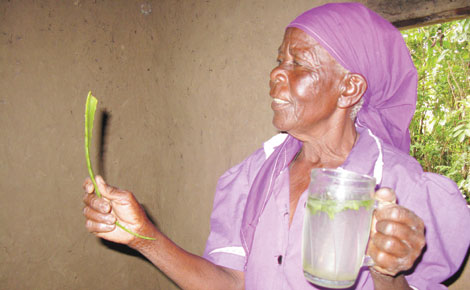 Catherine Nanyama displays the herb she uses [PHOTOS: KIUNDU WAWERU/STANDARD]
Catherine Nanyama displays the herb she uses [PHOTOS: KIUNDU WAWERU/STANDARD]
KAKAMEGA COUNTY: There is a hint of a smile playing at the corners of her face, as with sure hands, Catherine Nanyama of Mateete Village, Kakamega County, draws out a bag of ‘poison’, a thing she would not have dared a few years ago.
She lays her paraphernalia on the table in her living room, whose walls are smeared with mud-cow dung. There are fresh leaves, and five bottles with liquids of varying colours — from clear, to crimson, to really dark.
The liquids from the leaves, dried and boiled then mixed with expert hands, can either prevent a pregnancy or terminate one.
In faltering Kiswahili, Nanyama, with a cup in one hand, and one of the bottles bearing the herbal medicine in the other, says: “Chukua mbegu, mix with a little musembe and murubaine and aloe vera…” she then picks up a golden sachet labelled tea-leaves, “add a dash of majani chai, and Omo (detergent),” she smiles “…ukinywa hiyo, (drinking that), in a day, a two months pregnancy will come out.”
In almost every village of Western Kenya, in Kakamega, Bungoma, Busia counties and others, there are respected women herbal healers whose speciality is ukunga (midwifery).
The medics, according to Dr Isaac Omeri of Aids Population and Health Integrated Assistance (Aphia Plus) have been at loggerheads with the women they refer to as Traditional Birth Attendants (TBA). This is because many mothers have lost their lives under their care. But as Nanyama demonstrates, the women do more than assist women to give birth.
Not far from her village, in Kiliboti is Dorca David, who Nanyama celebrates as more of an expert. Curiously Dorca, displays almost similar dosage.
Dorca says she has assisted many women to safely deliver. However, she adds that as a mkunga you cannot miss women who, for one reason or the other, want to terminate a pregnancy.
UNSAFE ABORTIONS
“Wengi wao ni watoto wa shule (most of them are schoolgirls). Some play silly with young men and fall in the family way. Hawa wasichana huja kwetu wakilia tuwasaidie,” other times, she adds, parents also bring teenagers seeking abortions. She says incest is also rampant in the region.
Desma Mundiri, a community coordinator in the region with Ipas, an organisation that works to reduce maternal deaths due to unsafe abortions, says incest is seen as normal.
Abortion is illegal in Kenya. However, the 2010 Constitution allows it only when the life of the mother and the baby are in danger. Even then, it has to be done by a qualified person.
Dorca recounts the story of a relative, whom we also meet. The 17-year-old arrives with a tiny, two-month-old baby, who is lucky to be alive. She had been defiled by her stepfather.
Dorca now refers all the cases, including those giving birth to recommended clinics.
“I went to a clinic in Matsakha,” recounts the shy teenager, “I was given an injection.” She was seven months pregnant, but lied that she was four months, “it took three days and when it came out, the baby was alive,” she says in Kiswahili. And most of the cases are as dramatic. The TBAs we meet recount the case of unfaithful wives, who after their clandestine liaisons, bear seeds of discord, seek to terminate them.
“In Western, most husbands work in Nairobi and other towns. Their women get lonely and fall in other men’s arms. When they fall pregnant, they trick their husbands to come home. If they get their wish, the man will be tricked. But if it fails, the pregnancy must end?” she says..
Dorca, believing that chapter is now behind her, says that women have bled to death after taking the herbal concoctions. Nanyama shakes her head, but says the herbs do not always work. What the two do not know is that their region has the highest number of unsafe abortion complications in the country.
According to the Government report launched last year, Incidence and Complications of Unsafe Abortion in Kenya: Key findings of a national study Nyanza and Western recorded 45,027 cases of people seeking post abortion care, second to Rift Valley, which had 46,912 cases.
And the Kakamega County Executive in charge of Health Elsie Muhanda says that they have incorporated the midwives through partnership as they want the mothers to benefit from the national government’s free maternal health care. She admits that maternal mortality has been high in the area, but adds that it is now going down.
It is for this reason, coupled with the fact that the community prefers to give birth at home than at the health centres that Aphia Plus, in 2011, started training the TBAs.
Dr Isaac Omeri, Aphia Plus Senior Programme Officer, says the TBAs do not meet WHO guidelines for safe delivery.
“After training, we use the TBAs as referring agents,” he says. “Though the government is encouraging women to give birth at hospitals, we realised the TBAs cannot be dismissed as they already have an established clientele.”
Omeri says the TBAs get Sh200 for every referral. For an abortion, they can earn anywhere from Sh100 to Sh2,000 depending on who is procuring.
Talking of clientele, in Kibilu Village is 70-year-old Rhoda Masanganjila. She has been a mkunga since 1972, and has helped most women there deliver and seen most being born.
She learnt the art from her grandmothers. Over the years, she has received trainings and today, she refers all her cases to the health centres. Professional to a fault, she jots every detail of her clients in an exercise book.
“Right here, is a woman who delivered yesterday. There was no time to refer her and I called the chief detailing the circumstances,” she says, adding that the law has been tough on them, for every woman must give birth at a health centre.
However, the nearest health centre is many kilometres away. Masanganjila says she sees people who want to terminate pregnancies but adds, “hao tunawatuma hosipitali.”
Masanganjila spends most of her time educating her folk on family planning. She displays herbs that she claims can ‘close’ any womb. She also has condoms in abundance for those in need. She says: “Times have changed, people should have less children. ”
The United Nations Development Programme, citing causes like unsafe abortion, severe bleeding, infection and obstructed labour, says maternal mortality in Kenya remains unacceptably high. It records a high of 488 maternal deaths per 100,000 live births.
But in the villages of Western Kenya, as in other areas, numbers mean nothing. What matters is personal circumstances and desperation. That is the wisdom of the TBAs.
 The Standard Group Plc is a multi-media organization with investments in media
platforms spanning newspaper print
operations, television, radio broadcasting, digital and online services. The
Standard Group is recognized as a
leading multi-media house in Kenya with a key influence in matters of national
and international interest.
The Standard Group Plc is a multi-media organization with investments in media
platforms spanning newspaper print
operations, television, radio broadcasting, digital and online services. The
Standard Group is recognized as a
leading multi-media house in Kenya with a key influence in matters of national
and international interest.











